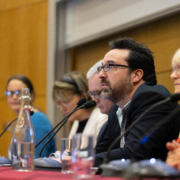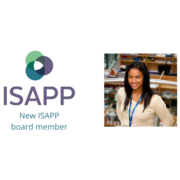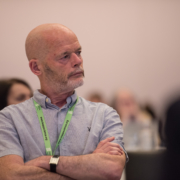Welcoming ISAPP’s newest board member, Dr. Geoffrey Preidis MD PhD
At the 2024 annual scientific meeting in Cork, Ireland, the ISAPP board welcomed its newest member, Dr. Geoffrey Preidis MD PhD of Baylor College of Medicine and Texas Children’s Hospital.
ISAPP President Prof. Maria Marco PhD says, “We are thrilled to have Dr Preidis on our board. He is a great colleague and brings scientific excellence along with the extensive clinical experience needed to translate scientific advancements to patient populations and stakeholder groups.”
Dr. Preidis holds degrees from Harvard University and Baylor College of Medicine (BCM), and is a board-certified Pediatric Gastroenterologist and Associate Professor of Pediatrics at BCM. His research focuses on intestinal microbiome development in extremely premature infants and how probiotics may reduce the risk of necrotizing enterocolitis, sepsis, feeding intolerance, growth failure, and death.
 Dr. Preidis has already made numerous valuable contributions to ISAPP-led initiatives in the past several years. For example, he coauthored a 2023 paper in JAMA Pediatrics, titled “Probiotics in the Neonatal Intensive Care Unit—A Framework for Optimizing Product Standards”, and has presented and contributed at previous ISAPP meetings on the topic of pediatric microbiome development and rational biotic use. Dr. Preidis was also featured in the 2024 annual meeting program, providing an expert overview of scientific and clinical state of affairs in an expert panel addressing the topic of probiotics for preterm infants.
Dr. Preidis has already made numerous valuable contributions to ISAPP-led initiatives in the past several years. For example, he coauthored a 2023 paper in JAMA Pediatrics, titled “Probiotics in the Neonatal Intensive Care Unit—A Framework for Optimizing Product Standards”, and has presented and contributed at previous ISAPP meetings on the topic of pediatric microbiome development and rational biotic use. Dr. Preidis was also featured in the 2024 annual meeting program, providing an expert overview of scientific and clinical state of affairs in an expert panel addressing the topic of probiotics for preterm infants.
Dr. Preidis says, “I’m excited for this opportunity to work with the distinguished experts on the ISAPP board to help advance the science of biotics and ultimately improve clinical care for children with gastrointestinal disorders.”







